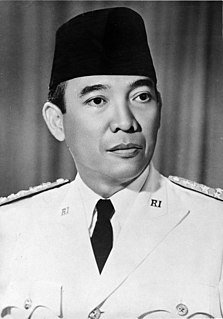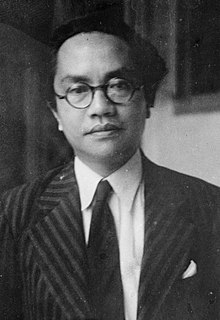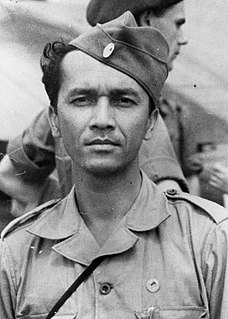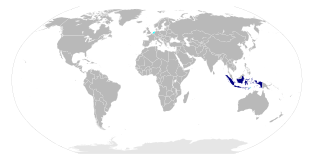
Sukarno was the first President of Indonesia, serving from 1945 to 1967.

Mohammad Hatta was Indonesia's first vice president, later also serving as the country's prime minister. Known as "The Proclamator", he and a number of Indonesians, including the first president of Indonesia, Sukarno, fought for the independence of Indonesia from the Dutch. Hatta was born in Fort De Kock, West Sumatra, Dutch East Indies. After his early education, he studied in Dutch schools in the Dutch East Indies and studied in the Netherlands from 1921 until 1932.

The Socialist Party of Indonesia was a political party in Indonesia from 1948 until 1960, when it was banned by President Sukarno.

Sutan Sjahrir was an avant garde and idealistic Indonesian intellectual, as well as revolutionary independence leader. He became the first prime minister of Indonesia in 1945, after a career as a key Indonesian nationalist organizer in the 1930s and 1940s.

Amir Sjarifuddin Harahap, also spelled Amir Sjarifoeddin Harahap was a socialist politician and one of the Indonesian Republic's first leaders, becoming Prime Minister during the country's National Revolution. A Christian convert from a Muslim Batak family, Amir was a major leader of the Left during the Revolution. He was executed in 1948 by Indonesian Republican officers following his involvement in a Communist revolt.

Syahrir was a prominent Indonesian political economist. He was officially appointed by President of the Republic of Indonesia, Susilo Bambang Yudhoyono as Economic Adviser in the Council of Presidential Advisers on 11 April 2007. As a student activist, he was once sentenced to jail during the Malari demonstration in 1974.
The New Indonesia Party of Struggle is a political party in Indonesia. It was established as the New Indonesia Alliance Party by the economist Dr. Sjahrir and was initially made up of university students, middle-class people and the leaders of several political parties. In a speech on 23 September 2002, Sjahrir said he wanted to establish the party because he was frustrated and angry with the political situation dominated by corruption and the craving for power.

The first Sjahrir Cabinet was the second Indonesian cabinet, named after the Prime Minister. It served from November 1945 to February 1946.

The second Sjahrir Cabinet was the third Indonesian cabinet and the second formed by Sutan Sjahrir. It served from March to June 1946.

The third Sjahrir Cabinet was the fourth Indonesian cabinet. It served from October 1946 to June 1947, when it fell due to disagreements related to implementation of the Linggadjati Agreement and subsequent negotiations with the Dutch.

The first Amir Sjarifuddin Cabinet was the fifth Indonesian cabinet and was in office from 3 July to 11 November 1947.
The Socialist Party of Indonesia was a political party in Indonesia. It was founded at a meeting in Jogjakarta on 13 November 1945. The Defence Minister Amir Sjarifuddin was the chairman of the party. Parsi was largely made up by Amir Sjarifuddin's former colleagues from the wartime resistance struggle in East Java. Some of then originated in Gerindo, a leftwing, nationalist and pro-Sukarno group active before the war. There were also some persons, like Abdulmadjid, Moewaladi and Tamzil, who had lived in the Netherlands during the war, and taken part in the anti-fascist resistance struggle there. The primary objective of Parsi was the independence of Indonesia from colonial rule, which was to be followed by the construction of a socialist society.
The Socialist Party was a political party in Indonesia. It was founded in December 1945 at a meeting in Cheribon, as the Socialist People's Party (Paras) of Prime Minister Sutan Sjahrir and the Socialist Party of Indonesia (Parsi) of Defence Minister Sjarifuddin merged. Sjahrir became chairman of the unified party, whilst Sjarifuddin became vice-chairman.
The Labour Party of Indonesia was a political party in Indonesia.

Soedjatmoko, familiarly called Bung Koko, was an Indonesian intellectual and diplomat. Born to a noble father and mother in Sawahlunto, West Sumatra, after finishing his primary education, he went to Batavia to study medicine; in the city's slums, he saw much poverty, which became an academic interest later in life. After being expelled from medical school by the Japanese in 1943 for his political activities, Soedjatmoko moved to Surakarta and practised medicine with his father. In 1947, after Indonesia proclaimed its independence, Soedjatmoko and two other youths were deployed to Lake Success, New York, to represent Indonesia at the United Nations (UN). They helped secure international recognition of the country's sovereignty.

"Our Struggle" was a pamphlet written late October 1945 by Indonesian independence leader Soetan Sjahrir. It was pivotal in redirecting the Indonesian national revolution.

Adnan Kapau Gani, often abbreviated as A. K. Gani, was an Indonesian politician. Born in West Sumatra, he spent much of his youth in Java, where he studied medicine and became involved with the nascent nationalist movement before going to South Sumatra to work as a doctor. During the Indonesian National Revolution he served three terms as Minister of Welfare; two of these were concurrent with terms as a deputy prime minister. Afterwards Gani went to Palembang, South Sumatra, where he remained active in politics until his death. In November 2007 Gani was made a National Hero of Indonesia.
Wikana was an Indonesian minister and independence leader. He was one of the youths who forced Sukarno and Hatta to declare independence immediately after the surrender of the Japanese. He was the first Indonesian Minister of Youth and Sport. He was a member of the Indonesian Communist Party. Sometime after the coup d'état attempt, he was arrested and went missing.

Hamid Algadri or Hamid Al-Gadri was a pioneer of freedom for Indonesian independence who was meritorious in Linggadjati Agreement, Renville Agreement, Dutch–Indonesian Round Table Conference and one of the members of parliament in the founding days of the Republic of Indonesia.

Brig. Gen. Daan Jahja or Daan Yahya was an Indonesian military officer who was the Chief of Staff of the Siliwangi Division in 1948 and the Military Governor of Jakarta from 1949 to 1950.













